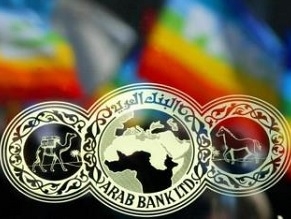|
World Jewish News

Peace flags are reflected on the Arab Bank window during anti-wardemonstration in Rome. Photo: REUTERS
|
Terror finance trial plaintiffs: Arab Bank records show funds were transferred to Hamas
15.08.2014, Israel and the World Plaintiffs told the jury in the Arab Bank terror financing trial on Thursday that “you will see bank records in black and white that say ‘Hamas’” as proof the bank knew it was being used to fund terrorism.
One of the lead plaintiffs’ lawyers, Mark Werbner said that evidence would show that the bank required “all their employees to donate 5 percent of their salaries” to the second intifada.
The plaintiffs allege that Arab Bank, Jordan’s sovereign bank with branches in 30 countries, facilitated massive transfer of funds to Hamas leaders and institutions, as well as to the families of imprisoned Hamas members and suicide bombers, via Saudi Arabia and Hezbollah’s al-Shahid Foundation.
It is alleged that Arab Bank knew the transfered funds were not solely related to terrorists and terrorist groups, but used in attacks – a charge that the Jordanian institution denies.
Werbner added that the funds that passed through the bank “is the oxygen that feeds these kinds of organizations.”
Tab Turner, another plaintiff’s lawyer, said that the evidence would show “millions, literally millions” of dollars “flowed right down the middle of Madison Avenue.”
Turner also said that the applicable US anti-terrorism financing law on the issue says, “thou shalt not provide financial services to foreign terrorist organizations.”
He accused the bank of serving “as the paymaster” for an alleged terror-funding Saudi Arabia-related committee.
Aside from the accusations, the plaintiffs displayed photographs, bank records, bank letters and internal memoranda to prove their case while opening with a description of a March 28, 2001, terrorist attack connected to the case, and allegedly to the bank.
Werbner said that the bank had not made a mistake but that “it was a choice.
He added that the bank assisted with terror financing because it was “the ideology of the bank,” which made public statements characterizing Israel as the enemy.
The plaintiffs outlined payments from the bank to 24 suicide bombers’ families, 145 operatives families and 11 living operatives, 92.5% of which were paid in cash
They mentioned advertisements in newspapers asking for martyrs’ families to come to the bank to collect payment.
Shand Stephens, representing the bank, said, “our hearts go out to the victims,” but that “we’re not here with Hamas as a defendant,” distinguishing the bank as having no knowledge that funds were being wired through it to terrorists.
He added that the plaintiffs unfairly argued that “every neighbor knew every neighbor” and that the bank, which conducts millions of transactions a year, genuinely did not know that terrorists were the recipients of the funds.
Stephens, in trying to humanize the bank, noted that the brother of bank chairman Sabih al-Masri was killed in a terrorist attack – without making a direct link to the case.
Rather than the emotional underpinnings of the case, the defense lawyers highlighted that the technical workings of the bank’s compliance systems checked watch-lists for electronic fund transfers.
The case has massive diplomatic implications.
A critical issue, which brought the US State Department, Justice Department and Treasury Department to loggerheads over what official US policy should be, is an April 2013 sanctions order imposed by a New York federal court which significantly penalized the bank for refusing to disclose key documents that the plaintiffs said they need to prove their case.
The bank had refused to turn over certain documents, saying it could incur criminal sanctions from Jordan and Lebanon for violating bank secrecy laws, but a lower US court rejected this rationale.
Arab Bank maintained its claim that the transfers were made with no knowledge of wrongdoing at the time – despite the terrorism-connected persons the transfers were made to, including Hamas leader Ismail Haniyeh, arch-terrorist commanders (now deceased) Salah Shehada and Ahmed Jabari, and Hamas founder Ibrahim al-Muqadama.
By YONAH JEREMY BOB, FRANK G. RUNYEON
JPost.com
|
|
